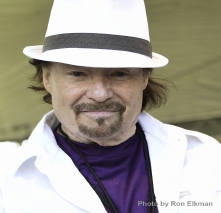
When Sly & The Family Stone came onto the scene in the late 1960’s, they truly were “A Whole New Thing” – a band made up of men and women with different racial backgrounds who mixed soul, funk, and psychedelic rock to give music that could simultaneously make you dance and take you higher.
The band’s musical mastermind was Sly Stone, who wrote brilliant songs like “Dance to the Music”, “I Want To Take You Higher”, “Stand!”, “Everyday People”, and “Thank You (Falettinme Be Mice Elf Agin)”. In 1969, they released the classic album Stand! and had a breakthrough performance at Woodstock.
Sadly, Sly descended into drug addiction, from which he never really recovered. There were concert delays and cancellations, and only one more classic album came out – 1971’s There’s A Riot Goin’ On. Later efforts were spotty, and the original band was no more by 1975.
But the music lives on in The Family Stone, which features original Sly & The Family Stone members Jerry Martini (saxophone) and Greg Errico (drums). This interview with Martini, who was with Sly & The Family Stone from its beginnings in 1967 through its demise in 1975, was for a preview article for the 4/21/16 concert by The Family Stone at the Chumash Casino. It was done by phone on 4/7/16. (Ron Elkman photo)
Jeff Moehlis: What can people look forward to at the upcoming concert?
Jerry Martini: What you can look forward to is a lot of fresh new energy. We have members of the Rock and Roll Hall of Fame – myself and Greg Errico – and we also have the daughter [Phunne] of Sly Stone and the recently departed Cynthia Robinson. So we have rock royalty – she’s the only child of two Rock and Roll Hall of Famers – and she sings like an angel. She can be a comedian or she can be dead serious. She’s great.
And, also, taking her Mom’s place is a good friend of mine – he used to be in the band earlier. His name is Jimmy McKinney. He plays keyboard, and he plays trumpet also. After losing Cynthia, I really needed just to have another trumpet player out there with me, because I’m still mourning her.
Anyway, the band sounds great. Jimmy’s been with us for about six months, and the show’s better than ever. He dances all over the stage, and just adds a lot of fresh energy to our unit.
You can look forward to hearing all the major hit songs, and a lot of new energy.
JMo: Sounds good. And it looks like Alex Davis will be on vocals?
JMa: Yeah. Alex Davis is what I call our “Sly guy”. He’s wonderful. Sly’s brother Freddie Stone said when he came and saw us in Vallejo, “When Alex came out – the way he looked, the way he dressed – the hair stood up on my arms. He reminded me so much of my brother. Even his facial movements and voice.” He does a perfect Sly Stone. He does a perfect Larry Graham. I found him about ten years ago in a band where he did all kinds of different voices. He did Ray Charles, he did Bill Withers, Larry Graham, and Sly Stone. He’s a multi-talented singer, and he’s loved by everybody.
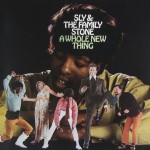
JMo: I know this is documented elsewhere, but how did Sly & The Family Stone first form?
JMa: I started it with Sly. I knew Sly for many years before that. We were close friends since the ’50’s. I recorded with him, we played in some cover bands together in the late ’50’s and very early ’60’s. Then we worked up in San Francisco in North Beach in different bands. We just hung out together, and I thought he was one of the most brilliant people I’d ever met in my life. To this day, I haven’t met anybody that had the writing talents and the vision. He was such a visionary person. I’d never met anybody like him.
When I do articles and stuff for Rolling Stone magazine and all the big ones, a lot of times they just want to get some dirt. You know, I’m not going to tell you any dirt on him. A lot of times, people who are geniuses like that, as they get older, sometimes they get caught up in Babylon, you know? [laughs] When Sly moved to L.A., everything changed. All those people got ahold of him, gave him a lot of stuff for free, and made him dependent on it. The person that I grew up with was no more.
But the positive thing about that is that he contributed so much to music, and to the whole scope of things. Having the vision of having the first integrated American pop group, that had blacks and whites and girls and boys on the front line, it just totally changed all of the policies that were going down at the time. And so I tell everybody, just love the guy for what he did, for goodness sakes. He contributed so much. Don’t look for dirt now. Sly’s never going to be Sly again, and he’s younger than me. I play little duo gigs by my house. I played last night for four hours, and my lip was going to fall off.
I’ve been there since the beginning. Since before the beginning. I remember when he became a DJ. He tried to put a couple Family Stone bands together. He just called it Sly and the Stoners back then. It didn’t fly. And it didn’t fly because he didn’t have the right people. He even had Cynthia playing with him in an earlier band, but it just wasn’t the right combination. And then all of a sudden…
When he was a DJ, I used to go bother him and stuff, and hang out, and talk him into doing crazy things like singing his radio show. He actually sang his whole radio show one night. I was on the way to my gig out at San Francisco Airport, and he sang the news. He had a piano right behind the board. He sang the news, he sang the weather, he sang the commercials, and he sang all the introductions to the songs. It’s never been done before. He’s an amazing person. I just laughed. In those days there was a place called the Tiger A Go Go, at the Hilton Airport Inn. It’s another hotel now – this was fifty years ago.
JMo: Can you tell me the story of the first time Sly & The Family Stone played at the Apollo Theater?
JMa: The first time we played at the Apollo Theater, back in those days the East Coast and West Coast were really very separated. The music industry was different. The people on the East Coast generally thought of Sly & The Family Stone as an all-black band. We used to come out one at a time, and when Greg came he had curly hair all down his face, and they didn’t pay him much attention. He’s a little bit darker Italian than I am. I’m a total white boy even though I’m Italian. Anyway, we’re coming out one at a time, and Larry and Freddie and the drums are already out, and when Cynthia and me walked out, they saw me with a super-white face and the long hair down my back. They started booing and yelling, and causing a commotion.
So Sly, he stopped the show for a minute, and he gave one of his famous little speeches. “That’s right, he’s white, but you don’t have to be any color to be in this band. You just gotta be able to play.” And he goes, “Play Jerry!” Oh God! I was freaking out. I was 26 years old. So I just played by myself for a little while, and I played a little bit of blues. And then one of the girls in the audience said, “Send that boy out here!” And all the guys started laughing, and then it became funny. So I counted it out, and from that point on, it was like my acceptance into Harlem, in a turbulent time when there was a lot of racial tension and everything. I get treated by all colors so good, I’m just so proud to be in the position that I’ve been in for the last 50 years, where you’re accepted by all races, whether it be Latino or Caucasian or African-American or Asian. They went crazy for us in Japan a few years ago.
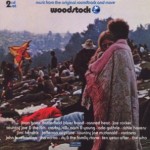
JMo: Of course I have to ask you about Woodstock. What are your memories of that?
JMa: Every minute [laughs]! I have almost total recall.
Well, we never thought it was going to be that big. It was just another festival. When we got there it was utter chaos. There were cars everywhere. It was a big, giant, muddy mess. It wasn’t actually in Woodstock, it was in Bethel, New York. We got to the backstage. Back in those days, you only had one stage. They didn’t have two or three stages, or a moving stage like they do nowadays. We were supposed to go on at 10:00PM, and we were there early. We were there about 6:00 or 7:00. It was a mess going through. A lot of the people flew in on helicopters. I drove in in one of the limos through the forest. It was crazy, a maze.
So we came in and waited and waited and waited and waited, and finally about 3:00AM we came on, and people were laying down sleeping in their sleeping bags. After the first song and the introduction, we saw people starting to get up. And then they started jumping up and down, then they started lighting their matches or whatever it was. I think it was before BICs even [laughs], you know. They didn’t show their cellphones – there were no cellphones. It was one of the best, amazing crowds I’ve ever played for in my life. I remember the hair standing up on my arm when we played. We tripled, quadrupled our money after Woodstock. We went from playing the small casinos into the large arenas. It was fantastic.
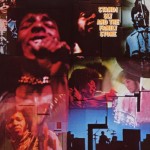
JMo: That [1969] was a good year for you guys – the Stand! album came out that year, also.
JMa: Oh yeah.
JMo: What are your reflections on that particular album?
JMa: It was a revolutionary album. It was a visionary album. The song “Stand!’ itself became like the national anthem for all the colleges. It was a song that signified freedom of choice, freedom of speech. If you listen to the lyrics closely enough on that song, you realize that he really knew what he was talking about.
He was an absolute genius, there’s no doubt in my mind. I’ve never met anyone like him. If he never does anything ever again, or he makes these impromptu appearances and stuff and falls down and all that stuff, that all doesn’t matter. None of that stuff matters. It’s what he did and what he contributed to the music world, and to the world in general, that counts. That’s what they’re going to remember later on. They’re not going to remember that Sly became a drug addict or whatever, or he could hardly walk. They’re going to remember the stuff that he left behind, the songs he wrote, and what he contributed. That’s how I remember him. As far as I’m concerned, I’ve just always loved the guy. He changed my life.
JMo: How did the song arrangements come together, say for a song like “Stand!”? Was it a group effort, or did Sly have his vision?
JMa: Actually, pretty much he wrote everything. Everybody contributed. Freddie made his parts in there, and Larry with his – it was the same thing. But he had everything in his mind like a puzzle, and nothing bumped into each other. It’s not like a lot of arrangements where you’ve got a horn guy to come in to arrange the horns, and stuff. It was totally different. All the parts fit together like a puzzle. They didn’t bump into each other.
He would do double parts, he would have one horn line going against the other. I had a lot to do with it, but he had the final word, and actually to be honest with you, he knew exactly what he wanted. It was his songs – he loved them all. All of us contributed a lot. I gave him a lot of ideas for songs and stuff, but I didn’t write them. He wrote them. I mean, he could be talking to you back then… He carried a pad and pencil around with him all the time, and you might say something that struck him. He wrote it down, and next thing you know that would be part of, if not a theme for, a song that he would write. He was just so mentally alert. It was just a pleasure being around him.
I drove the equipment truck back in those days before roadies, driving across the United States, and Big Daddy – his father – would be in the big giant station wagon behind him with the rest of the band. Here we are traveling on the road, going through Detroit, getting stopped by the National Guard and put in the troop truck in Detroit. I have hours and hours and hours of stories…
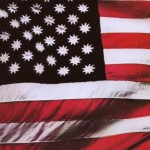
JMo: I want to ask you about There’s A Riot Goin’ On, another phenomenal album. What are your reflections on that album?
JMa: For me it was a little different, because once Sly moved to Los Angeles, he kind of lost touch with a lot of the people in the band. Most of the stuff at that time was done at his house in Bel Air, or various studios, and he’d bring everybody down one at a time. He was still brilliant, and it was still great, and he still had a lot of genius left in him.
But to me he was really no longer Sly, it was more like Sly Stone, and I was a member of the Family Stone. It wasn’t a unit like in the beginning, when we all went in and recorded mostly at the same time, and we were around all the time, all of us. We were active participants of everything. Later on, when he moved to L.A., it changed the face of the band, it changed the nature of it. We got him back up here for a while a few years ago, but now he’s back in L.A. again. And God bless him.
Riot was a great album. He still did a lot of good stuff. But after Riot, there wasn’t any more hits.
JMo: By that point he had developed a reputation for being late to concerts, and skipping some altogether. I’m not looking for dirt, but I curious how that was for you? Frustrating, I’m sure.
JMa: It was so frustrating that I don’t even have the words for it. My heart was in my toes half the time. I was there at the gigs. I was waiting with people. I was getting an ulcer. I was sick to my stomach. And it’s too bad, because he got caught up in Babylon and that’s what happened.
That’s why the Family Stone I have right now – and I’ve had it for over ten years and it’s been growing and growing – we’ve never missed a concert, never been late in the entire time we’ve been playing together as a unit. That’s what I have to say about all that.
Sly’s father was my roommate for a very long time at the beginning, and he was never late. His job he had in Vallejo, California, he was never late in 20 years, never sick a day in the 20 years. He used to tell me, “Man, if you get a flat tire, you’ve got to leave early enough that you can change that flat tire” – that was before AAA, you know [laughs] – “and still be on time for work.” That’s how I am now, the same way. I’m almost paranoid, the opposite about being late and being on time. That’s why we fly in a day early, that’s why we’re going down to Chumash a day early. That’s the rule I have. We go in a day early if people are flying in or driving down there. That’s a stipulation in my contract. Unless we’re close to him, unless I’m playing up at Cache Creek or Thunder Valley. Or if we’re doing two gigs close by, we’ll drive in day of. That’s fine.
JMo: What advice would you give to an aspiring musician?
JMa: You’ve got to think as a unit. It’s like any other team. It’s like a baseball team or a basketball team. It’s not just about one person, even if he’s the guy who calls the shots. For longevity, as far as staying together as a band or staying together as any team, there’s got to be teamwork. And one person can’t really put themself on a pedestal too much, because eventually he will fall. It’s like “Everybody is a Star”, there’s a line in there: “Ever catch a falling star / Ain’t no stopping ’til it’s on the ground”. You have to have humility, and you have to be a team player. That’s what I’d say to them.
And don’t be selfish. Most bands start fighting when they’re fighting over who’s writing the songs. I had a band called Rubicon a few years back, in between stuff. We played Cal Jam II, and it was doing really great. Then all of a sudden one guy didn’t want to play the other guy’s songs. He only liked his songs, you know what I mean? Teamwork is the answer.
JMo: I saw you at the House of Blues in Anaheim in 2008. Sly was there, and it was very cool to see him. Although he was two hours late…
JMa: That wasn’t my band. That was still Sly’s band. We played in it, but that wasn’t my Family Stone at all. There wasn’t one member of my band at that show except for me and Cynthia, and Cynthia has passed away. All I can say about that is it was like that every show we did, from 2006 at the Grammys, when we played in Japan, we played in Santa Rosa, and we played at the House of Blues. To me it was a nightmare. It was always the same thing – wait, hurry up and wait, hurry up and wait. It was bad back in the ’70’s because he had obstacles in his way. But he encouraged me to keep his songs alive by having a band that could really perform them, be on time, and be consistent.

Discussion
No comments for “Interview: Jerry Martini”